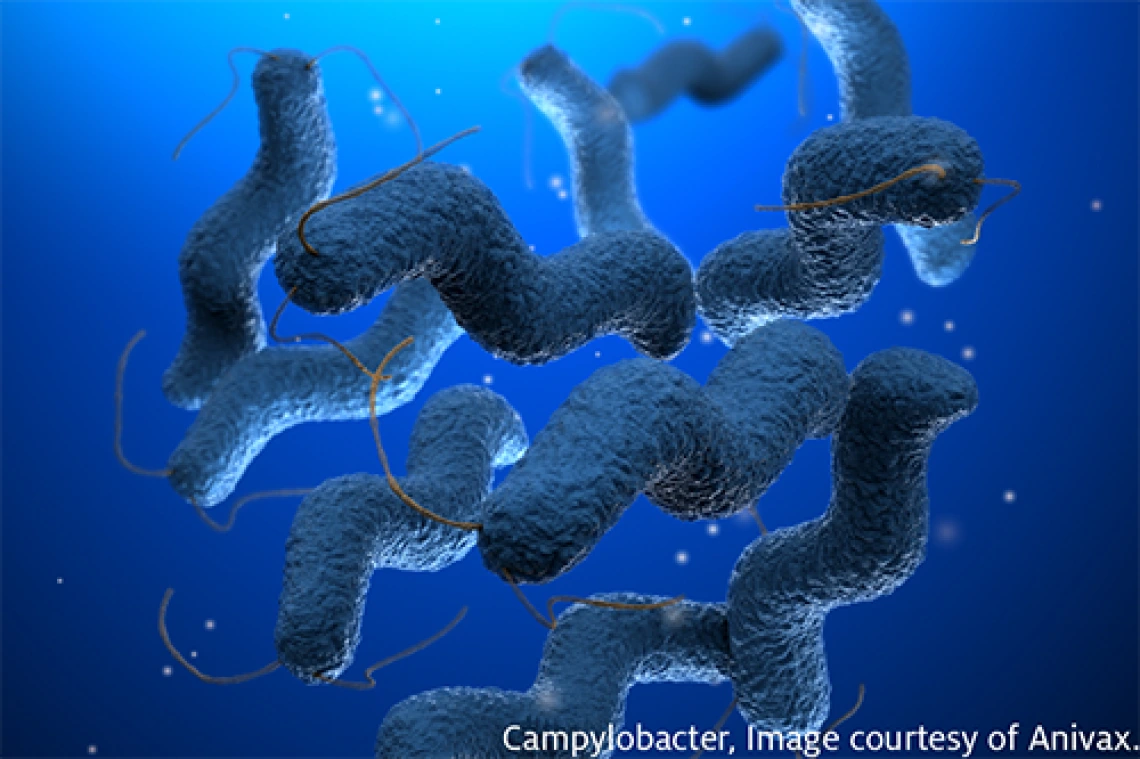Anivax Licenses UA-developed Poultry Vaccine

TUCSON, Ariz. – Anivax and the University of Arizona have announced an agreement to license several technologies developed in a broad-based collaborative effort between the UA and Arizona State University. The license is for a revolutionary Campylobacter food safety vaccine designed to be administered to poultry to reduce colonization by the bacteria and ultimately lowering the incidence of human disease and associated conditions.
The team of inventors includes individuals from both institutions, including: Bibiana Law, Ph.D., Associate Research Professor in the UA School of Animal and Comparative Biomedical Sciences, College of Agriculture and Life Sciences and Anivax’s chief science officer; Alexandra Armstrong, Ph.D., Assistant Research Scientist in the UA School of Animal and Comparative Biomedical Sciences, Food Safety Consortium Chair and Anivax’s VP of Research; Michael Anderson, Ph.D., Anivax’s VP of Products with 25 years of vaccine commercialization experience, and Roy Curtiss III, Ph.D. at ASU’s Biodesign Institute at Arizona State University.
Over the past week, Anivax has signed licenses with both the UA and ASU, with each license covering multiple pieces of intellectual property (IP), and each being an essential ingredient of the novel vaccine process. ASU provided the IP for the delivery mechanism – known as the “vector” – for the Campylobacter antigens. The antigens were discovered at the University of Arizona, and thus required a separate license.
The license for the UA IP was facilitated by Tech Launch Arizona, the cabinet-level office of the University dedicated to commercializing the inventions emanating from research. Tod McCauley, licensing manager for Tech Launch Arizona and the UA College of Agriculture and Life Sciences, helped negotiate the UA license. According to McCauley, “This team is comprised of the leading Campylobacter researchers in the world. It has been exciting to watch the group take important steps towards commercialization.”
Campylobacter jejuni infection is one of the most commonly identified bacterial causes of acute gastroenteritis worldwide, surpassing Salmonella. In the United States, it causes an estimated 1.3 million human health related cases costing over $1B in healthcare costs each year. In developing countries, Campylobacter species are an important cause of childhood morbidity. The most important post-infectious complication of campylobacteriosis is Guillain-Barré syndrome, an acute disease of the peripheral nervous system that affects approximately 4,500 people in the United States each year.
Sherry Hoskinson, director of Tech Launch Arizona’s Wheelhouse, notes that the Anivax license is a direct result of combining university technology, researchers and business partners to create a total solution.
“The UA license to Anivax and ensuing new investment and job creation are direct results of several programs implemented by Tech Launch Arizona at the UA,” according to Hoskinson. “We have worked diligently to create mechanisms to foster professional networks; improve relationships with UA colleges; recruit business leaders through our Commercialization Partners program; and refine cutting edge technology with Proof-of-Concept funding. Anivax is a success story for everyone involved.
Anivax CEO John Buttery, who is also a UA alumnus having earned his BS in Finance and an MBA from what is now the Eller College of Management said, “Tucson is the ideal location for a new venture like Anivax. I am fortunate to be working with the UA, ASU and our expert team of research professionals to create a world-class vaccine for Campylobacter.”
Dr. Law added, "We will use the platform to deliver our C. jejuni antigens. Preliminary trials have demonstrated a Campylobacter reduction in poultry of up to 4 logs with various constructs of the vaccine." According to Alexandra Armstrong, Ph.D., “Successful vaccination of chickens would potentially lead to compliance with the new USDA performance standards for Campylobacter in chickens, resulting in significant reduction of human illnesses.”
Contacts
Paul Tumarkin
Marketing & Communications Manager
Tech Launch Arizona
(520) 626-8770
pault@tla.arizona.edu
John Buttery
CEO - Anivax
(520) 357-0266
john@anivax.com
Additional media materials: http://www.anivax.com/media.html

